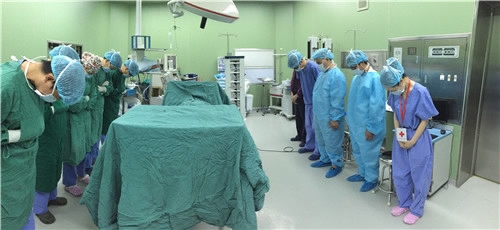英语新闻:捐爱妻器官救3人
她25岁,婚姻幸福美满,怀有8个月身孕,她的一生就是这样了,每个人都是这样认为的。但是王清春和她未出世的儿子的死亡给了另外三人新生。
She was 25 years old, happily married and eight months into her first pregnancy – a whole life was ahead of her, or so everyone thought. But the death of Wang Qingchun and her unborn baby in a fatal car accident gave a new lease of life for three people who were losing their battle with death, after the bereaved husband decided to commemorate his beloved wife by donating her organs.
On May 28, the life of Luo Xin – and that of three complete strangers – changed forever.

Chengdu Business Daily Photo
Luo had tried that day to convince his expecting wife to rest at their home in Chengdu, in southwest China's Sichuan Province, but Wang wanted to go about her everyday routine helping out at their restaurant, despite being weeks away from delivery.
They had debts to pay, and a baby was on the way – every penny earned would serve them well. But little did the duo know disaster was right around the corner.
Few minutes after Wang left the shop to deliver food, Luo received an ominous phone call from his brother: Wang had had a car accident and sustained a brain injury. The husband rushed to the scene, only to see his wife unconscious.
What followed was a spate of tragic events.
Luo stayed beside his comatose wife, refusing to give up on her, but doctors soon declared her brain dead after their efforts to save her failed. Their unborn child was also pronounced dead on June 1.
Still, Luo was not ready to allow death to do them part.

Chengdu Business Daily Photo
If doctors could not bring back his wife back to him, his wife might as well bring life back to those who have not run out of hope, or time.
He decided to donate her organs, amid shock and confusion from Wang's family – her liver and kidneys would be given away to save other people's lives.
“I have planned our future,” a sorrowful Luo told Huaxi Metropolis Daily, a local newspaper. “Some of her organs will be transplanted to help others. For us, her life will continue”.
China allows family members of a patient declared brain dead to donate their organs after signing documents permitting the transfer.

Huaxi Metropolis Daily Photo
Friday was the last farewell between Wang and her tearful family. Later in the day, her organs were found to match three patients, enlivening them and resuscitating Luo's hopes that his wife's death was not in vain.
The bittersweet story revived netizens' faith in humanity and breathed life into online discussions about selflessness and the meaning of love.
“He is an admirable husband. Although his beloved one was gone, she will save others’ lives. Both are good people,” a user who goes by the name @kxingfuzijizaok commented on China's Twitter-like Weibo.
“You never know what comes first: tomorrow or death. (We need to) cherish the people we love,” @mengxiangyuxianshidechajumy stated.

Chengdu Business Daily Photo
The number of organ donors in China has been on the rise owing to public awareness campaigns and increased understanding of the benefits of the procedure.
China saw 104,538 new potential organ donors last year, almost 100 times more than in 2010, according to China Organ Donation Administrative Center. Nearly 170,000 volunteers had registered as of the end of 2016, of whom over 60 percent are young or middle-aged people.
The Internet is also playing an important role is opening people's eyes to the possibility of donating organs while simplifying the registration process.
In December last year, China Organ Transplantation Development Foundation, backed by the National Health and Family Planning Commission, launched an organ donation function on Alipay, an online payment platform with 450 million users, attracting at least 100,000 volunteers in the first three months.
Estimates put those in need of organ transplants in China each year at about 300,000 patients.







